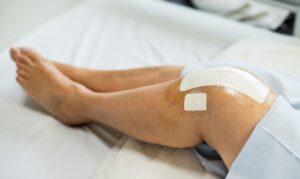Foot ulcers caused by diabetes are a common yet serious complication that can significantly affect your quality of life. If left untreated, they can lead to severe infections, amputations, and long-term mobility issues. However, with early orthopedic intervention, the healing process can be accelerated, and complications minimized. At Tec Orthopedics, we specialize in treating diabetic foot ulcers through advanced techniques that not only promote healing but also restore mobility. In this article, we will explore effective orthopedic treatments for foot ulcers caused by diabetes, offering practical advice and highlighting our commitment to improving your well-being.
What are Foot Ulcers and Why are They Common in Diabetic Patients?
Foot ulcers are open sores that form on the feet, often due to poor circulation and nerve damage—conditions commonly associated with diabetes. When blood flow to the extremities is compromised, the body struggles to fight off infections, and wounds take longer to heal. Additionally, diabetic neuropathy (nerve damage) can make it difficult to feel pain, meaning you might not notice an ulcer until it has become a serious issue. Diabetic foot ulcers are particularly common because high blood sugar levels can damage blood vessels and nerves, leading to further complications.
The risk of developing foot ulcers is higher in individuals with long-term diabetes, especially those who struggle to control their blood sugar levels. Proper diabetic foot care is essential to reduce the likelihood of these ulcers, but when they do occur, orthopedic intervention is key to preventing complications.
The Importance of Early Orthopedic Intervention for Foot Ulcers
When diabetic foot ulcers are detected early, orthopedic intervention can prevent infection and more severe damage. Orthopedic specialists are trained to address the underlying issues that contribute to foot ulcers, such as poor circulation, nerve damage, and abnormal pressure distribution. By managing these factors effectively, orthopedic care promotes healing and reduces the risk of complications.
The importance of timely treatment cannot be overstated. Without proper care, foot ulcers can progress to severe infections, leading to the need for surgical interventions or even amputation. Early intervention allows for proper wound management, pain relief, and support for mobility.
Orthopedic intervention is not just about wound healing; it’s about restoring your independence and quality of life. By addressing pain, improving circulation, and preventing further damage, orthopedic treatment ensures that patients can continue to engage in daily activities without compromising their health.
Key Orthopedic Treatments for Foot Ulcers
Orthopedic treatment for diabetic foot ulcers includes several key approaches designed to promote healing and prevent further complications. These treatments focus on managing the ulcer, supporting tissue repair, and restoring mobility:
- Wound Care Management: Proper care of the ulcer site is crucial. This includes regular cleaning, dressing, and monitoring for signs of infection. Specialized wound care products, such as advanced dressings, help promote faster healing by keeping the area moist and protected.
- Pressure Relief Techniques: One of the main contributors to foot ulcer development is prolonged pressure on the feet. Orthopedic solutions, such as custom orthotics, special footwear, and offloading devices, can relieve pressure on the ulcer site, promoting healing and preventing new ulcers from forming.
- Tissue Preservation: When foot ulcers are caught early, tissue can often be preserved through targeted treatment. For more severe cases, orthopedic surgeons may perform procedures to remove necrotic tissue, creating an environment conducive to healing.
- Advanced Technology: At Tec Orthopedics, we use cutting-edge technologies, such as laser therapy and bioelectric treatments, to stimulate tissue repair, enhance circulation, and reduce inflammation. These non-invasive therapies help speed up the healing process and reduce the need for more invasive treatments.
The Role of Footwear and Custom Orthotics in Diabetic Foot Ulcer Treatment
Footwear and custom orthotics are essential components of Orthopedic Treatment for Foot Ulcers Caused by Diabetes. Proper footwear provides necessary protection and support to the feet, reducing friction and preventing further injury to the ulcerated area. Diabetic patients are often advised to wear shoes that fit properly and have sufficient cushioning.
Custom orthotics, specifically designed to suit individual foot shapes and needs, help redistribute pressure evenly across the foot, ensuring that no one area bears the brunt of the weight. These orthotics also improve alignment and reduce the risk of new ulcers forming. By addressing the underlying mechanical issues that contribute to foot ulcers, custom orthotics provide long-term benefits for mobility and comfort.
At Tec Orthopedics, we offer personalized orthotic solutions tailored to each patient’s needs. These orthotics can be designed to accommodate existing foot ulcers or prevent new ones from developing.
Preventing Foot Ulcers in Diabetic Patients: Orthopedic Tips for Long-Term Health
Preventing foot ulcers is a top priority for diabetic individuals, and orthopedic care plays a crucial role in long-term prevention. Here are some essential tips for keeping your feet healthy and preventing ulcers:
- Regular Foot Examinations: Schedule regular foot exams with your orthopedic specialist to catch any early signs of ulcers or other complications. Early detection allows for immediate intervention and prevents ulcers from worsening.
- Proper Foot Care: Daily foot care routines, such as washing, drying, and moisturizing the feet, can prevent the development of skin cracks and sores. Ensure your feet are dry and avoid any irritants or injury.
- Appropriate Footwear: Invest in well-fitting shoes with soft, cushioned insoles. Avoid shoes that may rub against the feet or create pressure points.
- Manage Blood Sugar Levels: Proper control of blood sugar is key to preventing complications related to diabetes, including foot ulcers. Follow your healthcare provider’s advice to keep your blood sugar levels within the recommended range.
- Quit Smoking: Smoking can reduce circulation and hinder the healing process, making it even more important to maintain healthy blood flow to the feet.
How Tec Orthopedics Supports Patients with Diabetic Foot Ulcers
At Tec Orthopedics, we are committed to providing comprehensive care for patients with diabetic foot ulcers. Our experienced orthopedic specialists take a personalized approach to each case, offering tailored treatment plans that promote healing and prevent future complications.
We focus on:
- Conducting thorough assessments to understand the severity of foot ulcers.
- Employing advanced treatments like custom orthotics, advanced wound care, and bioelectric therapies.
- Offering education and ongoing support to help patients maintain proper foot care and prevent future ulcers.
By choosing Tec Orthopedics for your diabetic foot ulcer treatment, you are partnering with a team that values your overall health and strives to restore your mobility and independence.
Takeaway
Foot ulcers caused by diabetes can lead to serious complications, but with early orthopedic care, you can prevent infection and promote healing. By seeking treatment at Tec Orthopedics, you gain access to a wide range of solutions that address not only the ulcer itself but also the underlying causes of the condition, such as poor circulation and nerve damage.
Don’t wait until complications arise. If you or a loved one is struggling with diabetic foot ulcers, schedule a consultation with Tec Orthopedics today to begin your journey to recovery and improved quality of life.






